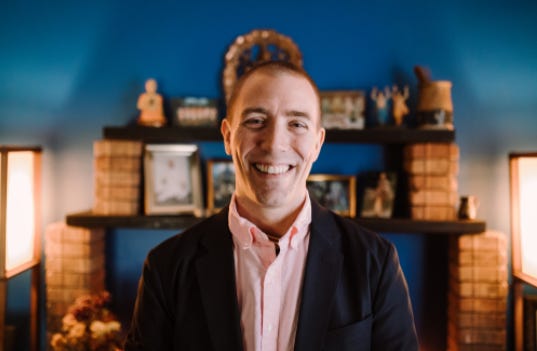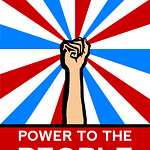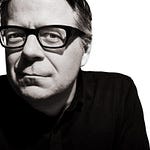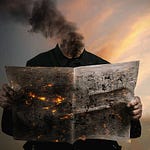vol. 3 issue 25
Greetings,
This podcast episode with Acyuta-bhava Das, an ayahuasca vision quester and now a spiritually focused astrologer and bhakti yoga practitioner, is the third and final in our series exploring the intersection of mental health, psychedelics, and democracy.
The tone and feel of this conversation is cozy and inviting, largely because of the energy of my guest. When I re-listened to it before posting it, I was yet again captivated by Acytua’s positive wonder at the world, inflected with a deep wisdom gained not just from being in more than 100 ayahuasca ceremonies, but also from having a mind and body trained on what truly matters in life. Best of all, as Acyuta and I discuss, this peace of mind and state of hope and expectation is available to all of us.
Born Adam Elenbaas, Acyuta grew up a Methodist preacher’s kid in a family haunted by various personal demons, as he describes in his book Fishers of Men: The Gospel of an Ayahuasca Vision Quest. An addiction to opioids and other drugs along with a spiraling depression eventually culminated in a dabble with psychedelics. Whereas he thought he would have fun taking the novel drugs, instead Acyuta (then still known as Adam) had a “magic mushroom” induced spiritual crisis that led him to want to know more about what was beyond what we perceive only with our eyes.
It was then that he sought help from ayahuasca shamans in the Amazon, where use of the bitter purgative brew is contextualized through ceremony and spiritual practice.
The psychedelic ceremonies helped Acyuta end his addictions and depression, and inspired him to become a bhakti yogi, a spiritually focused astrologer and teacher, and a noted expert on responsible psychedelic use.
I have been so blessed to bring you all three of these conversations about psychedelics, as each has been nuanced, rich, funny, and also mind blowing. The “mind blown” quality not just because they are about psychoactive drugs, but because this entire series has opened new lines of questioning that even I didn’t anticipate. It has shaken apart the ossified structures of old beliefs and pressed for us to think how we might build new, more flexible, authentic ones.
Even though my online journal’s full name is “docu-mental: mapping the american states of mind”, I really hadn’t understood how intricately linked our mind is to democracy.
What brought that home hard for me was the conversation with author Brian Muraresku about how the Greeks of the Antiquities could have brought us science as well as democracy, while also serving up all the strange tales of Gods romping with humans, sexually and otherwise. It seems it was their use of psychoactive substances that took them from the “logical” to places where wisdom was gleaned from the gods in fantastical ways, simultaneously metaphorical yet real, and in that way the most “real” of all. In other words, the Greeks were the ones to access and translate for us the archetypes of earthly existence, an essential understanding for humans if we are to evolve.
This is why being in possession of our minds is essential. If we keep outsourcing our innerspaces to the attention merchants who aggregate our minds, then profit from them by dimming our capacity for imagination and authenticity and instead making us slaves to the various cults of branding, we will never achieve democracy. We will never be free.
So, then. What can psychedelics teach us about how to be and stay free? That is, even if personally, we never choose to use these drugs? (And, as I mention in all three interviews, I have not ever used psychedelics and so do not speak from direct experience.)
That is the focus of my discussion with Acyuta. The funny thing is, we never really talk long about the psychedelics themselves, but instead, about the greater lessons learned from allowing there to be more than one paradigm of reality.
The questions raised in this interview still have me thinking about how to frame reality in a post-truth world where liars and visionaries can be hard to tell apart.
My conversation with Acyuta truly is the most enlightened and enlightening discussion about the nature and necessity of hierarchy I personally as yet have been fortunate to have – and one which I am doubly fortunate to be able to share with you in this podcast.
I so highly recommend you listen. It’s an opportunity to spend time with a person who is real in ways that are beyond “real”. The discussion will inspire you to think differently about what matters in your life, and whether you are emphasizing those things or letting them slip away.
But it will also give you hope that creating a meaningful life is always, always within your power.
The time stamps/audio chapters for this conversation are listed below.
Here are the other posts and podcasts relevant to this conversation:
Why you should care who controls psychedelics - docu-mental (substack.com)
Howard University exemplifies cancel culture, but not without our help - docu-mental (substack.com)
Peace,
Whitney
Time stamps for audio chapters:
0:00 Introduction
1:41 What does name Acyuta-bhava mean?
3:50 Story of what led him from being a preacher’s kid who’d become an opioid addict, to a psychedelic vision-quester who inspired his sister and preacher father to also use psychedelics
9:45 Description of what using psychedelics feels like, and how it changes one’s perception of self and of world
11:23 The adventure of mind v. escaping pain
14:18 The group experience of the same visions during psychedelic ceremonies emphasizes importance of ceremonial context v. recreational or therapeutic without care for soul
21:50 Not respecting context will lead to “colonization” of psychedelics, and will have dire consequences
25:00 True “shamanism” v. New Age bullshit
32:10 Illuminating discussion about how and why science being “neutral” is still a proactive stance. “Every paradigm, including science, creates things, has a point of view, and so has ramifications.”
35:55 Nature shows us the way to play with our myths, stories, and ceremonies to make them relevant to each new era
37:30 The implications of this for policymaking
41:00 What questions are necessary to ask if we are to go around Big Pharma to control our own access to resources of transcendence?
45:00 Earth in peril because science can’t cure greed.
47:00 Description of hierarchy in action: being ayahuasca ceremony listening to things being killed and eaten in rain forest. Understanding of hierarchy as a necessity, and as something to learn to engage with, not conquer. Discussion of what happens when trying to overtake hierarchy.
52:00 The importance of “spiritual technologies” such as yoga, to move us beyond thinking in only one paradigm.
54:00 Progress without spiritual evolution leads to cynicism.
57:00 Current disruptions to our paradigm such as new UFO info, other events, demonstrate need for new tools, but how learn without indoctrination?
1:04:00 The essential nature of kindness to evolution and to working with the gods. It invites them in, among many other things discussed.
1:10:00 Narcissism and kindness are antithetical.











